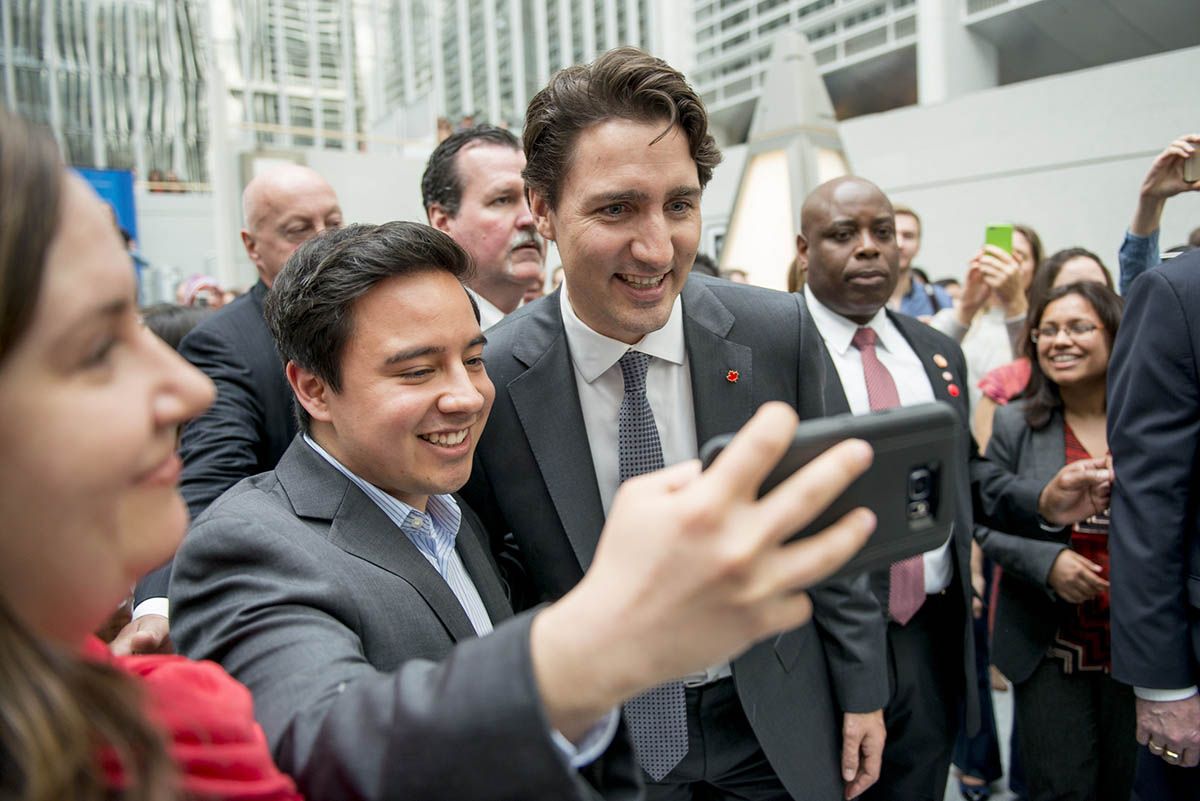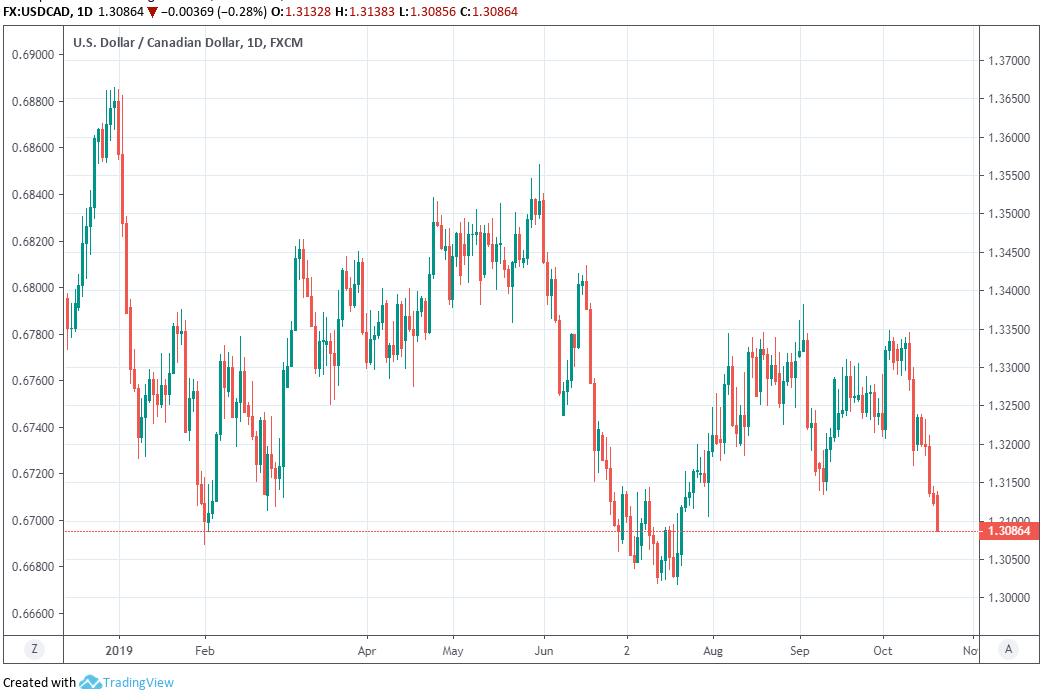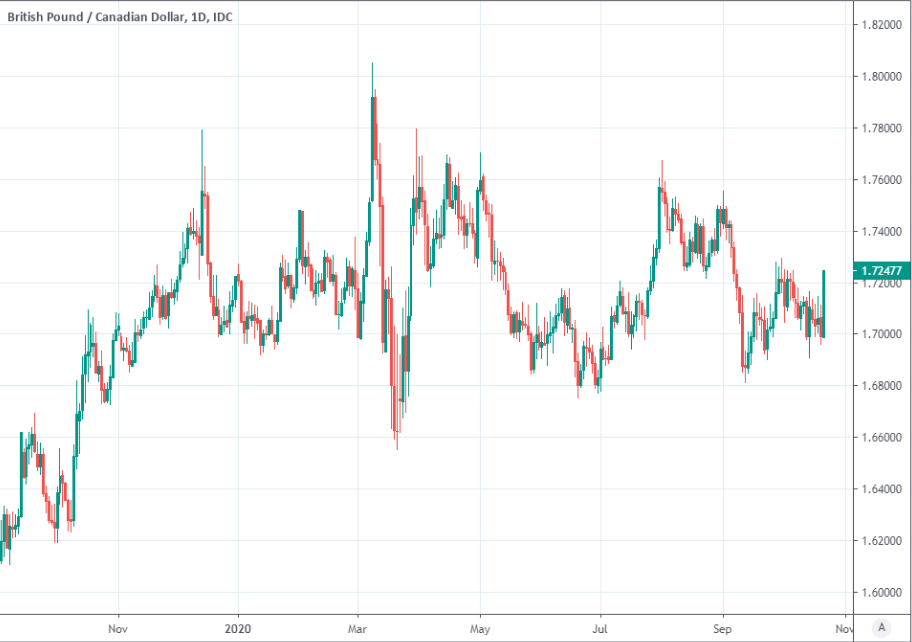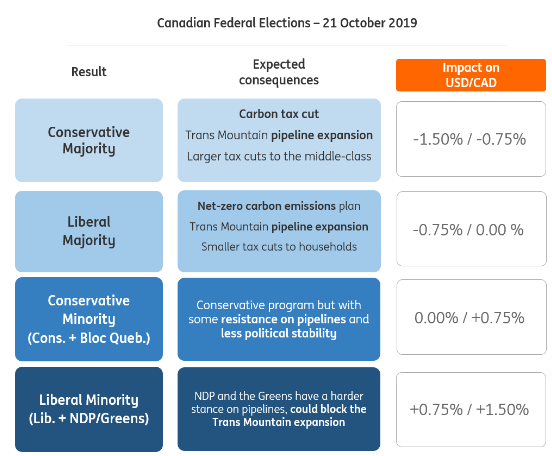The Canadian Dollar is Tipped to Climb Regardless of Election Outcome
- Written by: James Skinner

File image of Justin Trudeau. Copyright: World Bank Photo Collection. Accessed Flickr. Reproduced under Creative Commons licensing
- CAD treads water on election day as voters head to polls.
- But is tipped to climb higher regardless of the outcome.
- Similarity between agendas neutralises election uncertainty.
- Economy and BoC rate policy seen continuing to drive gains.
- But ING says difference in climate policies may matter to CAD.
The Canadian Dollar was creeping higher Monday even as voters prepared to choose the country's next government and is being tipped by some for further gains over the coming days irrespective of the election outcome.
Canadians are voting in an election Monday following a campaign period that's seen polls narrow to such an extent that analysts are describing the ballot as effectively being a coin toss, with barely any difference between polling numbers of both main parties. Incumbent Prime Minister Justin Trudeau, leader of the Liberal Party, has been running neck-and-neck against Conservative rival Andrew Scheer with both scoring around 33% in polls through the summer.
Elections normally mean uncertainty over the likely economic policies in subsequent years for the country in question so can often lead currencies to weaken ahead of the ballots, although this time it's different for Canada, mostly due to the fact that the economic platforms of the two main parties are strikingly similar. Both contain offers to cut taxes for individuals, although there is a difference in the climate policies of the two.
The result is expected after 22:00 eastern time, which is in the early hours of Tuesday morning London time.

Above: USD/CAD rate shown at daily intervals.
"Using the fiscal multipliers from the Department of Finance 2016 budget process, the Liberal and Conservative platforms have a similar implications for markets; a small boost to growth in 2020. As a result, this should keep any Bank of Canada easing a conversation for 2020 rather than this year. As such, we do not think that the election today or the platforms will impact the CAD in a meaningful way," says Mazen Issa, a strategist at TD Securities.
TD Securities, a Toronto-headquartered investment bank, says the most likely outcome from the election is a hung parliament. Canadian tradition has seen Prime Ministers who were unable to secure majority for themselves then provide opposition parties with an attempt to cobble together a government but the bank says this time around could again be different for Canada. The winner in a Canadian election needs to gain 170 seats to govern with a majority.
Issa and the TD team reckon Prime Minister Trudeau would be likely to either attempt to lead a minority government or to cobble together a coalition that draws on the support of smaller parties. Formal coalitions are unprecedented in Canada during modern times but the country has a long history of minority governments. Many minority administrations have lasted for more than a year, but almost all of them have failed within two years.
"The CAD looks likely to be driven by domestic data this week (Business outlook survey and retail sales, both of which should be modestly positive) and broader tone in risk sentiment. The latter remains supportive though perhaps a bit fatigued following the US-China trade truce. With this backdrop in mind, we think USDCAD might remain a touch heavy this week but the propensity to break below the 1.30 handle may be a bit premature," Issa says.

Above: Pound-to-Canadian-Dollar rate shown at daily intervals.
The Canadian Dollar is the best performing major currency of 2019, largely because the economy has outperformed almost all of its comparable rivals, enabling the Bank of Canada (BoC) to leave its interest rate unchanged at 1.75% even as other central banks have cut their own rates in response to an ongoing slowdown in global growth. That's encouraged resilience in Canadian bond yields, which have become more attractive to investors and helped the Canadian Dollar higher in recent months.
However, the BoC has warned repeatedly that Canada's economy won't remain immune to the global downturn forever and has repeatedly expressed concerns about the outlook for business investment in light of the U.S.-China trade war. And financial markets are betting the bank will eventually follow the Federal Reserve (Fed) and others by cutting the cash rate, although this is seen as something that's most likely to happen only in late 2020.
"Households are already in a good place given the strength of the job markets. The latest labour report showed employment growth is strong and wages are rising. With significant tax cuts, this could be enough to keep consumers resilient even though export-orientated parts of the economy may well come under pressure," says James Knightley, chief international economist at ING. "We still have the view that the Bank of Canada will eventually respond to the threats to growth with looser monetary policy."
If the BoC signals that it could cut rates long before the end of next year then it might wound the Canadian Dollar in the process because financial markets are not prepared for such action quite so soon.

Above: ING Group graph showing estimated USD/CAD responses to various election outcomes.
The BoC's rate outlook, and all of its drivers, could well be the biggest influence on the Loonie over the coming months but not everybody sees Monday's election as being quite as insignificant for the Loonie as TD Securities does.
ING's Knightley says the Canadian currency could benefit if the opposition Conservatives of Andrew Scheer happen to win a majority or are able to form either a minority or coalition government. This is in part because there's a substantial difference in the climate policies of the two parties, and one that might be meaningful to the markets.
Scheer's Conservatives have pledged to eliminate some carbon taxes and are committed to building a controversial oil pipeline that will more than double Canada's capacity to export oil. The country's energy sector, which is a significant contributor to the economy, has long suffered from a lack of transportation capacity that has left the sector a captive of the U.S. market in terms of export options.
"We believe there is a high potential for surprises, but the market impact will most probably depend on if one of the two larger parties - prime minister Justin Trudeau’s Liberals or Andrew Scheer’s Conservative party wins a majority," Knightley says. "A minority government seems to be the most likely possibility. Between a Liberal-led minority and a Conservative-led minority, we expect the first one to be more CAD-negative."
Time to move your money? Get 3-5% more currency than your bank would offer by using the services of a specialist foreign exchange specialist. A payments provider can deliver you an exchange rate closer to the real market rate than your bank would, thereby saving you substantial quantities of currency. Find out more here.
* Advertisement





